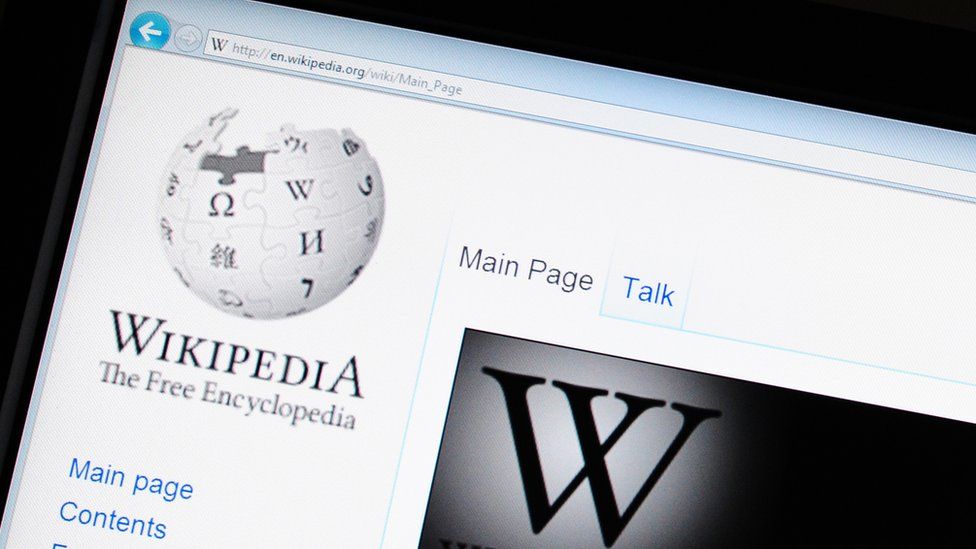Viewpoint: How I tackle Wiki gender gap one article at a time
- Published

Did you know that as of 27 November 2016, only 16.72% of the English language Wikipedia's biographies were about women?
That is a stark improvement on the 3% found in Ramon Armando Rodriguez's 1957 encyclopaedia of Venezuela.
Yesterday's encyclopaedias were a product of their time, and the "gender gap", a form of systemic bias, was rarely addressed.
But this is the 21st century, and Wikipedia, the encyclopaedia of our time, also struggles with it.
There are 295 different language Wikipedias. Each has gender-equity issues in two forms: the people who write articles, and the content which they produce.
As it happened:Women take over Wikipedia
Why is 100 Women partnering with Wikipedia?
"We've decided to team up with Wikipedia because, like the BBC World Service, they're a non-profit organization with a global and multilingual reach... As we've discovered during all our 100 Women seasons, there are so many untold stories all over the world about inspiring women both past and present. The edit-a-thon is aimed at capturing more of those stories for posterity. This is all part of a wider discussion about women's experiences online."
Fiona Crack: 100 Women editor
Ranked as one of the 100 most popular websites, Wikipedia's objective is to provide the sum of all human knowledge to everyone on the planet. How can we honour our mission when fewer than 16% of the people who edit Wikipedia are women?
Researchers have tried to sort out the reasons for this - lack of time, lack of confidence, and negative reactions to critical feedback, are among the answers. Some editors of Wikipedia stop taking part if they encounter harassment or trolling, while others bicker to no end. For some women, this is enough to deter them from even starting.
In 2011, Sue Gardner, then Executive Director of the Wikimedia Foundation (WMF), described nine reasons women don't edit Wikipedia. Though she set a goal of increasing women contributors to 25% by 2015, it appears the goal was not reached.
If we were to compile a list of every notable person who has lived on planet Earth since the beginning of time, and we were to agree that "notability" could only be established through the use of "reliable sources", men would outnumber women by a landslide.
Going back to the example of Rodriguez's encyclopaedia of Venezuela, you'll find most of the biographies are about military generals, politicians, and religious leaders. Historically, these occupations were taken by men. No wonder the number of women in Rodriguez's work is small. But women do appear in historical texts and it is our duty to find them.
Having identified a problem, let's do something about it. If I had a proverbial hammer, I would chip away at the "glass ceiling" forces that support the gender imbalance on Wikipedia. Instead, I rely on a computer.
What is 100 women?
BBC 100 Women names 100 influential and inspirational women around the world every year. We create documentaries, features and interviews about their lives, giving more space for stories that put women at the centre.
Spread the word by sharing your favourite posts and your own stories using #100women
Each month, about 250,000 new user accounts are created on Wikipedia, and mine, Rosiestep, was created on 4 June 2007.
Since then, I've created more than 4,000 new articles. I write on various topics, including biographies, architecture, and geography. A few notable ones come to mind, including controversial women such as the writer, Deolinda Rodriguez de Almeida. Nicknamed the "Mother of the Revolution", she was captured, tortured, and executed for her support of the growing independence movement in Angola.
Though I have a business degree, business was not my calling. I wanted to be a cultural anthropologist. I wanted to follow in the footsteps of Margaret Mead and study cultural anthropology at Barnard College (my mother's alma mater), like Margaret did. I wanted to travel to Papua New Guinea and do research on its people, like Margaret did. But my dad said "no" to anthropology - he wanted something more practical for my university studies.
Wikipedia has given me an outlet for the research I wanted to do. Anarchists and vedettes, writers and scientists, I've written about them all. Initially, I was surprised that anyone read a word that I wrote, but when I was notified that the article I started on Kallawaya people had been mentioned on the Wikipedia main page, I was humbled, recognising that my voice was important. More than 1,300 additional articles that I've worked on have been mentioned on the main page, more than any other woman. Every edit I've made - more than 113,000 - has been in the capacity of a volunteer; I haven't been paid for any of them. Yes, Wikipedia editors are volunteers.
I'm 40 years older than Emily Temple-Wood, the woman who shares the 2016 co-Wikipedian of the Year award with me. The fact Wikipedia co-founder Jimmy Wales singled us out with this honour shows the commitment of the Wikipedia community to breaking down the barriers associated with gender imbalance.
Roger Bamkin, user:Victuallers, and I co-founded Women in Red in 2015, inviting everyone, regardless of gender, to help us address Wikipedia's content gender gap.
The project maintains lists of notable women who don't have a Wikipedia article, and creates articles about them and their works - from the books they wrote, to the schools they founded, and the conferences they convened.
The project is becoming equally well known for its lists of missing articles as the articles it creates. Women in Red now maintains more than 130 lists of women who are historically significant but missing an article on Wikipedia.
Understanding that every one of us can contribute to the sum of all human knowledge is incredible. Never before in history has there been an opportunity for anyone to contribute to an encyclopaedia.
- Published7 December 2016